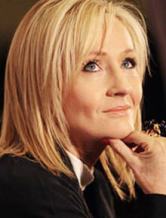 Come to find out, J. K. Rowling isn’t so different from the rest of us. Sure she has written one of the most popular series in English literary history, inspired a theme park attracting thousands of people every day to enter into a world of her own imagination, and could publish her grocery list with just about any press in the world (and, yes, people would still buy it). But maybe that’s where the differences end. Continue reading
Come to find out, J. K. Rowling isn’t so different from the rest of us. Sure she has written one of the most popular series in English literary history, inspired a theme park attracting thousands of people every day to enter into a world of her own imagination, and could publish her grocery list with just about any press in the world (and, yes, people would still buy it). But maybe that’s where the differences end. Continue reading
Category Archives: Writing
Writing and writing
Speaking of A. L. Kennedy, this quote from On Writing (2013) is simultaneously expressive and instructive: Continue reading
Confused by A. L. Kennedy
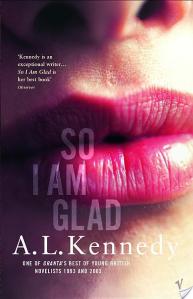 Funny how words and sentences and language work. The title to this post could mean at least two things:
Funny how words and sentences and language work. The title to this post could mean at least two things:
1. The ingenious Scottish novelist A. L. Kennedy wrote a new book titled Confused.
2. The ingenious Scottish novelist A. L. Kennedy writes in such a way that many readers are confused.
See how troubling this is? Since I enjoyed Kennedy’s dark, alcohol-fueled dream Paradise, I thought I’d give the critically-acclaimed So I Am Glad (Knopf, 1995) a shot (that’s right: #1, above, is false).
The narrator of So I Am Glad, Jenny, is a young woman who risks love by way of a mysterious man (“Martin”) who turns up in her flat. Along the way we learn about Jenny’s traumatic childhood, an abusive relationship with her ex-boyfriend, and her rather antiseptic occupation as an audio narrator. Throughout, the novel induces a state of bewilderment: the character dialogue is as pedestrian, random, and spasmodic as most conversations of everyday life, and even when Martin’s true identity is revealed, the reader remains uncertain and distrustful to the end.
Kennedy’s works are artful—brilliantly constructed—but certainly not for everyone.
Suffice it to say that when I finished the book I took a spin over to Goodreads—just to see what other readers thought. I quickly discovered that I am:
1. One of the few readers on the site to pick up the book and actually finish it.
2. One of the many readers on the site to find Kennedy’s whiplash dialogue construction confusing (there are few identifying references to guide readers, e.g. “said Martin,” “I stammered,” “he shouted,” etc.).
With reference to #1, I rarely fail to finish books I start reading. I also clean my dinner plate, watch through the end of the credits of most movies, and hate it when baseball games are called due to rain or darkness. I prefer to think of this as a virtue rather than a vice. Let’s call it faithfulness; the challenge keeps me going.
With reference to #2, I admit I had to reread the first thirty or forty pages of So I Am Glad more than once to make sure I was tracking the dialogue. Three times, actually. I suppose it’s a badge of honor that I eventually came to understand and even appreciate this rather depressing (and sometimes quite violent) fantasy of love and coming-to-terms-with-the-past novel. Reading this work helped me to see a development in Kennedy’s style that made me appreciate the stream-of-consciousness construction of Paradise all the more.
So I Am Glad . . . Sure I was confused, but you knew that by the name of this post, didn’t you?
Writing for the Crowds
I’m not saying we should all go back to inkwells or anything, but Sara Coleridge may be right. If we save our best writing for public consumption, we risk undervaluing the potential benefits of personal correspondence:
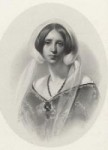 “Be Milton, however, what he may, I admire you for being eloquent about him in a private letter, just like my father, and unlike these folks, who treasure up all their thoughts that are not about vulgar things, for Reviews and Magazines or their next volume” (The Regions of Sara Coleridge’s Thought, ed. Peter Swaab [New York: Palgrave Macmillan, 2012], 21).
“Be Milton, however, what he may, I admire you for being eloquent about him in a private letter, just like my father, and unlike these folks, who treasure up all their thoughts that are not about vulgar things, for Reviews and Magazines or their next volume” (The Regions of Sara Coleridge’s Thought, ed. Peter Swaab [New York: Palgrave Macmillan, 2012], 21).
In light of this, I’m now considering writing a weekly “open letter” to the first 1000 friends who “like” my page on Facebook. jk
The Key to Success
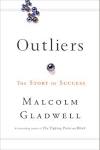 Several friends of mine recently told me that I simply must read Malcolm Gladwell’s Outliers: The Story of Success (2008). Some of these friends are business types—they manage money or make lots of it—or both. I’m a college professor, so I suppose they hoped I might be inspired by the book and one day put my talents to better use; make some money, perhaps.
Several friends of mine recently told me that I simply must read Malcolm Gladwell’s Outliers: The Story of Success (2008). Some of these friends are business types—they manage money or make lots of it—or both. I’m a college professor, so I suppose they hoped I might be inspired by the book and one day put my talents to better use; make some money, perhaps.
Gladwell’s Outliers grew out of a search for what sets apart successful people—“outliers” of society whose unusual success breaks the normal patterns of history. Most people, at least in the United States, explain success by looking to individual ability or genius. Gladwell points to the astounding number of self-help books and the genius-mystique surrounding technological trailblazers such as Bill Gates or Steve Jobs. The fascinating success of these “outliers” bolsters the appeal of the American myth of self-reliance.
In fact, Gladwell’s Outliers demonstrates what historians have told us all along: success isn’t simply the result of talent, self-determination, or genius alone. Success depends on context, community, and “coincidence.” Gladwell repeats a refrain throughout his book: some individuals “just happened” to have the right opportunities at the right time (whether the birth month of Canadian hockey players or unparalleled access to mainframe computers among up-and-coming techies in the 1960s and 1970s).
Gladwell’s idea got me thinking about some modern examples from literary and religious history. Many could be mentioned, but here’s just one: The English World War I poet Wilfred Owen had the tools for writing great poetry from early in his life, but his “success” derived from more than inspired vision. Poet-soldiers such as Owen, writing amidst destruction and death during the Great War, moved to the forefront of early twentieth-century literature because their writings gave voice to profound suffering and doubt around them, within them:
Dim, through the misty panes and thick green light,
As under a green sea, I saw him drowning. (from “Dulce et Decorum Est”)
Owen also depended on community: especially the influence of literary mentors such as Siegfried Sassoon.
Owen’s story—an outlier in the history of literature—challenges popular notions of success. He didn’t strike it rich through his poems. He “just happened” to die in the war. That’s hardly the stuff of success, and not the kind of thing you’ll find recommended in the self-help section of the bookstore. But in the case of a poet writing about suffering in the “war to end all wars,” death built a legacy to complement profound poetic achievement.
In truth, Gladwell’s Outliers illustrates, for those seeking fame and fortune through business, what any student of history already knows: the community shapes the individual, context is everything, and there’s really no such thing as coincidence. Of course, history also reveals what most books on success willfully choose to forget: there’s more to success than can be measured in the course of a lifetime.
(With thanks to my friends Bryant, James, Ted, and Doug.)
Writing Biography
“It was in the Romantic period that two roads diverged in the wood of literary Life-writing” (Bate). Jonathan Bate’s recent review of several new biographies of the Romantic poet John Keats in the Times Literary Supplement (TLS) raises a fascinating point of discussion.
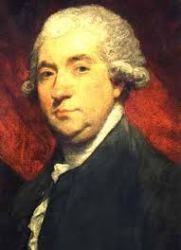 Bate explains two models of biographical writing that emerged during the Romantic period: “Boswell’s Life of Johnson (1791) had no truck with the idea that biography has a duty to be comprehensive . . . Boswell took the view that the biographer’s duty was not so much to deliver all the facts as to bring the character of the subject alive by narrating a series of vivid scenes . . . This, of course, worked wonderfully because Johnson was at his most brilliant in the art of table talk. The silent work of thinking, reading, writing and revising that fills the days of most writing lives is far less amenable to Boswellian treatment. William Hayley’s Life of Cowper (1803) accordingly offered an alternative model, proposing that letters are the richest resource for the literary Life-writer. And in the case of a quiet, introspective poet such as Cowper, he was right.”
Bate explains two models of biographical writing that emerged during the Romantic period: “Boswell’s Life of Johnson (1791) had no truck with the idea that biography has a duty to be comprehensive . . . Boswell took the view that the biographer’s duty was not so much to deliver all the facts as to bring the character of the subject alive by narrating a series of vivid scenes . . . This, of course, worked wonderfully because Johnson was at his most brilliant in the art of table talk. The silent work of thinking, reading, writing and revising that fills the days of most writing lives is far less amenable to Boswellian treatment. William Hayley’s Life of Cowper (1803) accordingly offered an alternative model, proposing that letters are the richest resource for the literary Life-writer. And in the case of a quiet, introspective poet such as Cowper, he was right.”
For writers and readers alike—whether of history or biography—the question demands answers. I’m currently writing an intellectual biography of Sara Coleridge (1802–52). History, ideas, and chronology shape the story, but many of the greatest moments belong to the splashes of life from her letters, diaries, and the personal reminiscences of her friends.
Bate’s TLS article poses the problem this way: “Thus the two roads diverged. If you believe that a writer’s inner life is best revealed through small details closely observed by friends (why did Dr Johnson keep his orange peelings?), then you should follow the Boswellian path. If you prefer a comprehensive, panoramic and more objectively arranged scene, then you will follow Hayley and begin with the chronological arrangement of your subject’s personal correspondence.”
The answer, of course, depends on the individual subject—this is no moral quandary. But I suspect that it also depends upon the reader and the aims of reading in the first place.
Imagine for a moment the one person you would love to meet from history. Perhaps it’s Julian of Norwich or Philip II of Macedon or Mahatmas Gandhi. Now imagine you had six months—or sixty years!—to spend with that individual and hear the intimate moments of family, taste the surrounding culture, and peek at the private writings that others only partially glimpsed or barely knew existed. How would you go about writing that life? Put differently, as a reader dependent on the perspective of an author, what kind of writer would you prefer to tell that “sacred history”? Would you side with Boswell or Hayley?—and why?
About “Reading History”
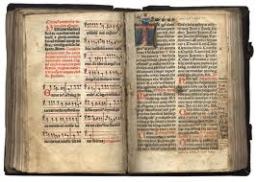 Reading History scares me a bit, honestly. As a writer, I prefer the stable and the formal to the fluid and spontaneous. The experience of writing a book comes to mind: every page is carefully prepared, edited, peer-reviewed, double-checked, and indexed before the final text is published and sent out to further reviewers, libraries, and individual readers. As a teacher, however, I’m very different: I love the spontaneous nature of discussion and the fluidity of conversations over texts, ideas, and possibilities. Perhaps this blog—which ostensibly offers reflections on literature, culture, and religion—lands somewhere in middle. Along the lines of Samuel Taylor Coleridge’s notebooks, Reading History is something of a “fly-catcher”—though I would not pretend to either Coleridge’s erudition or breadth of insight and inquiry. As a collection of thoughts and ideas, reflections, ruminations, criticisms and doubts, Reading History shares my guesses and suspicions on books and history and the ideas that shape our lives—but ever in the spirit of the classroom more than in the letters of a published article or book. Reading History offers sparks of intellectual curiosity, hypotheses and marginalia from the stories I read, ideas for future projects and articles I’d like to one day write, and notes on the notes of my research and teaching. Of course, the ideas here are my own (copyright, etc., etc.), and Reading History does not represent the institutions where I work, worship, or otherwise associate. Fear cripples the imagination, so I’ll post this now before I lose my nerve.
Reading History scares me a bit, honestly. As a writer, I prefer the stable and the formal to the fluid and spontaneous. The experience of writing a book comes to mind: every page is carefully prepared, edited, peer-reviewed, double-checked, and indexed before the final text is published and sent out to further reviewers, libraries, and individual readers. As a teacher, however, I’m very different: I love the spontaneous nature of discussion and the fluidity of conversations over texts, ideas, and possibilities. Perhaps this blog—which ostensibly offers reflections on literature, culture, and religion—lands somewhere in middle. Along the lines of Samuel Taylor Coleridge’s notebooks, Reading History is something of a “fly-catcher”—though I would not pretend to either Coleridge’s erudition or breadth of insight and inquiry. As a collection of thoughts and ideas, reflections, ruminations, criticisms and doubts, Reading History shares my guesses and suspicions on books and history and the ideas that shape our lives—but ever in the spirit of the classroom more than in the letters of a published article or book. Reading History offers sparks of intellectual curiosity, hypotheses and marginalia from the stories I read, ideas for future projects and articles I’d like to one day write, and notes on the notes of my research and teaching. Of course, the ideas here are my own (copyright, etc., etc.), and Reading History does not represent the institutions where I work, worship, or otherwise associate. Fear cripples the imagination, so I’ll post this now before I lose my nerve.
